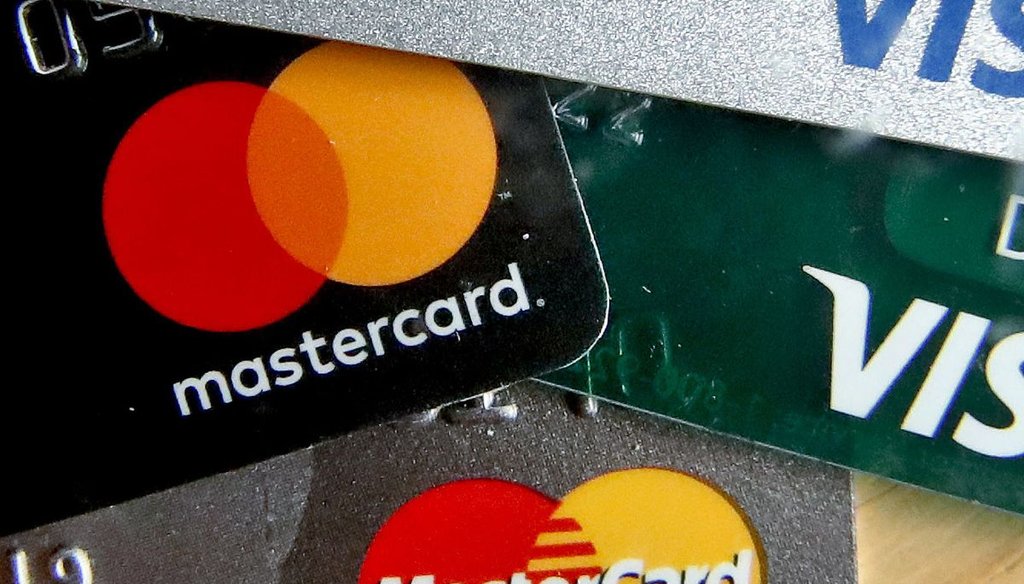Stand up for the facts!
Our only agenda is to publish the truth so you can be an informed participant in democracy.
We need your help.
I would like to contribute

(AP)
Does national credit card debt exceed $1 trillion for the first time ever? And what does that mean?
If Your Time is short
-
Numerically, West Virginia Gov. Jim Justice is right that national credit card debt topped $1 trillion for the first time, according to data from the New York Federal Reserve.
-
Focusing on credit card debt’s absolute value ignores that consumer debt is shrinking compared with the broader U.S. economy. Focusing on this number also leaves out that credit card debt accounts for only a modest proportion of all consumer debt.
West Virginia Gov. Jim Justice, a Republican, took aim at "Bidenomics" — President Joe Biden’s economic policies — as he runs to unseat incumbent Democrat Joe Manchin in the U.S. Senate.
"Bidenomics," Justice said in an Aug. 14 post on X, "is hammering Americans — Credit card debt is above $1 trillion for the FIRST TIME EVER. Joe Biden, and the radical left’s policies have hurt our economy, requiring families to rely on credit cards to make ends meet. We are all suffering the consequences."
Numerically, Justice is correct that national credit card debt recently set a record. But other economic data undercuts his argument that this represents a troubling milestone.
Justice’s office did not respond to inquiries for this article.
In his post, Justice cited an Aug. 8 CNBC article headlined, "Credit card balances jumped in the second quarter and are above $1 trillion for the first time."
The article noted that recently released New York Federal Reserve data showed that combined balances for credit cards had exceeded $1 trillion for the first time ever.
Elizabeth Renter, a data analyst at personal finance website NerdWallet, told CNBC that Americans benefited from excess savings and debt flexibility during the pandemic. But, she said, the inflation that peaked at 40-year highs in 2022 cut into those savings, forcing many families to rely on credit cards to pay for goods that had risen in price.
"Credit card delinquencies continue on an upward trend, a growing sign that consumers are feeling the pinch of high prices and lower savings balances than they had just a few years ago," Renter told CNBC.
However, this $1 trillion figure needs context.
Every quarter, the International Monetary Fund calculates the ratio of U.S. household debt to gross domestic product. This calculation clarifies the absolute value of household debt while putting it in a larger economic context.
Even if consumer debt is rising, it may be considered more sustainable if the national gross domestic product is rising at an even faster rate — something data shows has happened in recent years.
Consumer debt hovered around 100% of gross domestic product — the total of all economic activity in the U.S. — from late 2007 to late 2009. After that, the percentage slid as low as 75% in early 2019.
The ratio rose modestly during the pandemic to almost 82%, before falling back to 73% in 2023’s first quarter, the most recent quarter with available data.
In other words, even as consumer debt is rising in absolute dollars, it’s becoming smaller compared with the broader economy.
Despite crossing the $1 trillion barrier, credit card debt accounts for only a modest share of overall consumer debt. In 2021’s first quarter, for example, credit card debt accounted for 5.2% of all consumer debt. Besides credit card debt, consumer debt also includes home mortgages, auto loans and student debt. By 2023’s second quarter, that share had risen to 6%.
Also, as we have reported in the past, the economy is more complex to be controlled by any president.
Inflation, which appears to have driven the spike in credit card debt, has causes that "go back to (the) COVID(-19 pandemic) — issues like supply-chain constraints, workforce shortages, and other factors," John Deskins, director of the West Virginia University Bureau of Business and Economic Research, told PolitiFact West Virginia in September. "That is much larger than any particular Biden policy."
Gary Burtless, an economist with the Brookings Institution, a Washington-based think tank, said Biden should "assume some responsibility, but so should members of Congress who voted in favor of stimulus payments, tax cuts, generous unemployment benefits, aid to states and private businesses during and after the COVID-19 pandemic recession."
Although the American Rescue Plan received no Republican support in Congress, earlier pandemic relief bills passed with overwhelmingly bipartisan backing.
Our ruling
Justice said, "Credit card debt is above $1 trillion for the FIRST TIME EVER."
Numerically, Justice is right, according to New York Federal Reserve data. However, focusing on credit card debt’s absolute value ignores the shrinking size of consumer debt compared with the broader U.S. economy, and also leaves out that credit card debt accounts for only a modest proportion of all consumer debt.
We rate the statement Mostly True.
Our Sources
Jim Justice, X post , Aug. 14, 2023
Federal Reserve Bank of St. Louis, "Household Debt to GDP for United States," accessed Oct. 18, 2023
Federal Reserve Bank of New York, "Total Household Debt Reaches $17.06 Trillion in Q2 2023; Credit Card Debt Exceeds $1 Trillion," Aug. 8, 2023
Federal Reserve Bank of New York, "Household Debt and Credit Report, Q2 2023," accessed Oct. 18, 2023
CNBC, "Credit card balances jumped in the second quarter and are above $1 trillion for the first time," Aug. 8, 2023
PolitiFact, "Fact-checking Shelley Moore Capito on high mortgage rates and their causes," Oct. 5, 2023
Browse the Truth-O-Meter
More by Ashala Moseberry
Does national credit card debt exceed $1 trillion for the first time ever? And what does that mean?
Support independent fact-checking.
Become a member!
In a world of wild talk and fake news, help us stand up for the facts.


























